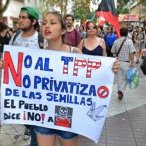English · Español

23 May 2016 | Interviews | Resisting neoliberalism
End of Sovereignty: Interview with Camila Montecinos on the advance of one of the largest free trade agreements in history
Download: MP3 (2.3 Mb)
The Transpacific Partnership Agreement (TPP) was signed on February 4th, 2016, and it became the landmark for the advance of negotiations that officially started in March 2010 to liberalize trade between 12 countries: Australia, Brunei, Canada, Chile, United States, Japan, Malaysia, Mexico, New Zealand, Peru, Singapore and Vietnam. Mobilizations against this ambitious agreement, also called NAFTA 2.0 with reference to the Free Trade Agreement between Mexico, US and Canada, are taking place in many of the countries that are part of it. In Chile, over a hundred organizations gathered in the Citizen Platform Chile Better off without TPP are carrying out a strong resistance agenda against the implementation of the treaty that now needs to be passed by the Parliaments of each country for it to become valid.
This week we talked to Camila Montecinos, member of organization GRAIN, to know more about the status of the negotiations of the TPP and the threats it represents for Chile, one of the countries at Latin American and world level, with most free trade agreements signed. About the causes of the TPP in terms of neoliberal policies in the country, Camila started by saying that the TPP: "deepens the levels of autonomy loss and reduces the possibilities to defend ourselves, in economic and legal terms, against the demands of the transnational capital. This agreement deepens everything that was signed in previous agreements".
One of the first aspects denounced by the Chilean activist is the fact that the TPP forces all its clauses to be reviewed periodically (every five years at most), enabling the possibility to change clauses in case transnational capitals consider that their interests are not being contemplated: "What we have here, unlike many other treaties, even the one we have with the US, is an open agreement that will give more and more guarantees to transnational capital".
Secondly, the TPP is trying to pretend that it will not threaten labor, environmental rights or other basic rights: "The treaty only includes good words, that are only that. It says that all countries have the right to protect their labor laws, that they should make sure that all rights are enforced, that nothing in the agreement can be interpreted against labor or public health laws, but it adds "as long as such provisions do not contradict this agreement".
Camila also made reference to a second element through which the TPP will imply a violation to the basic rights of the population: "The agreement includes a special chapter on what is called "legislative alignment". Through it, the countries commit to make all necessary legal changes so that laws are the same in the different countries".
"This opens the door for all kinds of pressure to make changes in labor laws, weakening them. Because, as established by this agreement, anything that a country does, whether a law, a regulation, a practice, a measure, is considered to be challengeable before international conflict resolution tribunals", warns Camila.
An even larger threat for common resources
Currently, hundreds of families of artisanal fisherfolk have been left without their livelihood due to a red tide in the South of the country. This is an example, according to Camila, of how common resources of a country can be severely compromised through free trade agreements: "In Chile, the sea has been privatized for the aquaculture industry and today the levels of pollution are so high that we´ve had an explosion of toxic algae (...). And this is mainly due to the fact that salmon transnational companies use the sea as a dumpsite. And we can´t do anything against this because it would be to attempt against the profit of companies". In addition, Camila said that in this crisis, companies "wash their hands" and the State is the one in charge of granting "some kind of subsidy for the people to eat".
The TPP is attempting to weaken the possibilities to build Food Sovereignty and defend biodiversity. About whether the agreement would force the Chilean government to sign the latest Convention of the International Union for the Protection of New Varieties of Plants (UPOV) of 1991, the activist said: "If ratified, we will have to accept the UPOV 91, but this goes beyond that: for instance, it opens the door to patent plants and animals".
The Chilean social movements and organizations are now focused on trying to prevent the Chilean Parliament to ratify the TPP, something that can happen before the end of this year.
Imagen: http://prensaopal.cl/







